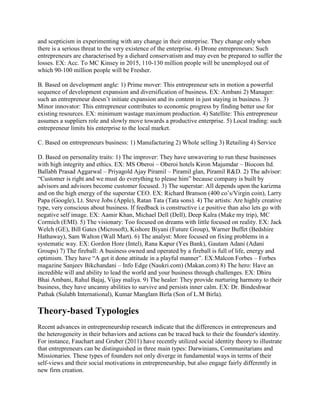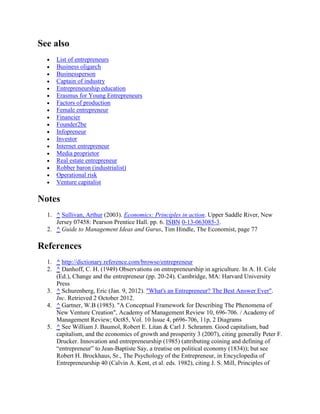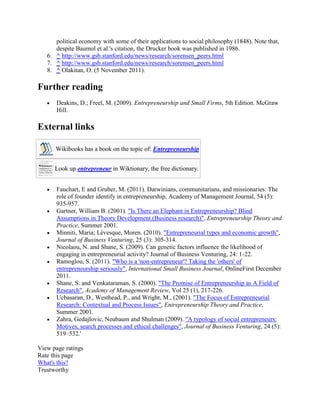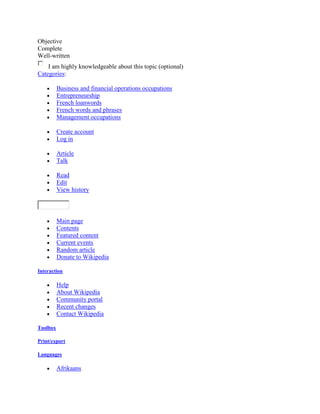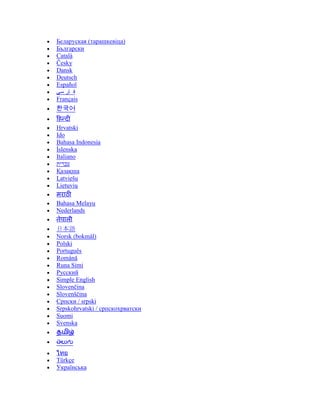An entrepreneur is someone who starts a business or venture with risk and initiative. The article discusses the history and definitions of entrepreneurship. It covers characteristics like innovation, risk-taking, leadership and opportunity recognition. Entrepreneurs can be classified based on their functions, development angle, business type, and personality traits. Factors like peers, social environment and genetic factors may influence someone's likelihood of becoming an entrepreneur.
![Please read:
a personal appeal from
Wikipedia founder Jimmy Wales
Read now
Entrepreneur
From Wikipedia, the free encyclopedia
Jump to: navigation, search
For the practice of starting a new organization, see Entrepreneurship. For the magazine, see
Entrepreneur (magazine).
This article includes a list of references, but its sources remain unclear because it has
insufficient inline citations. Please help to improve this article by introducing more
precise citations. (November 2011)
An entrepreneur ( i/ˌ ɒntrəprəˌ nɜr/) is an enterprising individual who builds capital through
[1][note 1]
risk and/or initiative. The term was originally a loanword from French and was first
defined by the Irish-French economist Richard Cantillon. This term first appeared in the French
Dictionary "Dictionnaire Universal de Commerce" of Jacques des Bruslons published in 1723.
Entrepreneur in English is a term applied to a person who is willing to help launch a new venture
or enterprise and accept full responsibility for the outcome.
Contents
1 Scholarly definitions
2 Influences and characteristics of entrepreneurial behavior
3 Perception of entrepreneurs
4 Classification of entrepreneurs
5 Theory-based Typologies
6 See also
7 Notes
8 References
9 Further reading
10 External links
Scholarly definitions
Over time, scholars have defined the term in different ways. Here are some of their definitions.](https://image.slidesharecdn.com/entership-121011095401-phpapp02/75/Entership-1-2048.jpg)
![1725: Richard Cantillon: An entrepreneur is a person who pays a certain price for a
product to resell it at an uncertain price, thereby making decisions about obtaining and
using the resources while consequently admitting the risk of enterprise.
1803: J.B. Say: An entrepreneur is an economic agent who unites all means of
production- land of one, the labour of another and the capital of yet another and thus
produces a product. By selling the product in the market he pays rent of land, wages to
labour, interest on capital and what remains is his profit. He shifts economic resources
out of an area of lower and into an area of higher productivity and greater yield.
1934: Schumpeter: Entrepreneurs are innovators who use a process of shattering the
status quo of the existing products and services, to set up new products, new services.
1949: C.H. Danhoff: Entrepreneurship is an activity or function and not a specific
individual or occupation . . . the specific personal entrepreneur is an unrealistic
abstraction.[2]
1961: David McClleland: An entrepreneur is a person with a high need for achievement
[N-Ach]. He is energetic and a moderate risk taker.
1964: Peter Drucker: An entrepreneur searches for change, responds to it and exploits
opportunities. Innovation is a specific tool of an entrepreneur hence an effective
entrepreneur converts a source into a resource.
1971: Kilby: Emphasizes the role of an imitator entrepreneur who does not innovate but
imitates technologies innovated by others. Are very important in developing economies.
1975: Albert Shapero: Entrepreneurs take initiative, accept risk of failure and have an
internal locus of control.
1975: Howard Stevenson: Entrepreneurship is "the pursuit of opportunity without regard
to resources currently controlled."[3]
1983: G. Pinchot: Intrapreneur is an entrepreneur within an already established
organization.[note 2]
1985: W.B. Gartner: Entrepreneur is a person who started a new business where there
was none before. [4]
Influences and characteristics of entrepreneurial behavior
Management skill and strong team building abilities are often perceived as essential leadership
attributes for successful entrepreneurs. Robert B. Reich considers leadership, management
ability, and team-building as essential qualities of an entrepreneur. This concept has its origins in
the work of Richard Cantillon in his Essai sur la Nature du Commerce en (1755) and Jean-
Baptiste Say [5] in his Treatise on Political Economy.
Psychological studies show that the psychological propensities for male and female
entrepreneurs are more similar than different. A growing body of work shows that
entrepreneurial behavior is dependent on social and economic factors. For example, countries
with healthy and diversified labor markets or stronger safety nets show a more favorable ratio of
opportunity-driven rather than necessity-driven women entrepreneurs. Empirical studies suggest
that men entrepreneurs possess strong negotiating skills and consensus-forming abilities.
Research studies that explore the characteristics and personality traits of, and influences on, the
entrepreneur have come to differing conclusions. Most, however, agree on certain consistent](https://image.slidesharecdn.com/entership-121011095401-phpapp02/85/Entership-2-320.jpg)
![entrepreneurial traits and environmental influences. Although certain entrepreneurial traits are
required, entrepreneurial behaviours are also dynamic and influenced by environmental factors.
Shane and Venkataraman (2000) argue that the entrepreneur is solely concerned with opportunity
recognition and exploitation, although the opportunity that is recognised depends on the type of
entrepreneur; while Ucbasaran et al. (2001) argue there are many different types contingent upon
environmental and personal circumstances.
Jesper Sørensen has argued that some of the most significant influences on an individual's
decision to become an entrepreneur are workplace peers and the social composition of the
workplace. In researching the likelihood of becoming an entrepreneur based upon working with
former entrepreneurs, Sørensen discovered a correlation between working with former
entrepreneurs and how often these individuals become entrepreneurs themselves, compared to
those who did not work with entrepreneurs. [6] The social composition of the workplace can
influence entrepreneurism in workplace peers by proving a possibility for success, causing a “He
can do it, why can’t I?” attitude. As Sørensen stated, “When you meet others who have gone out
on their own, it doesn’t seem that crazy.” [7]
Perception of entrepreneurs
The ability of entrepreneurs to innovate is thought to relate to innate traits such as extroversion
and a proclivity for risk-taking. According to Schumpeter, the capabilities of innovating,
introducing new technologies, increasing efficiency and productivity, or generating new products
or services, are characteristic qualities of entrepreneurs. Entrepreneurs are catalysts for economic
change, and researchers argue that entrepreneurs are highly creative individuals with a tendency
to imagine new solutions by finding opportunities for profit or reward.[8] Largely due to the
influence of Schumpeter's heroic conceptions of entrepreneurs, it is widely maintained that
entrepreneurs are unusual individuals. In line with this view, there is an emerging research
tradition investigating the genetic factors that are perceived to make entrepreneurs so distinctive
(Nicolaou and Shane, 2009).
However, there are also critical perspectives that attribute these research attitudes to
oversimplified methodological and/or philosophical assumptions (Gartner, 2001). For example, it
has been argued that entrepreneurs are not that distinctive, but that it is in essence unrealistic
preconceptions about "non-entrepreneurs" that maintain laudatory portraits of "entrepreneurs"
(Ramoglou, 2011).
Classification of entrepreneurs
A. Based on functional characteristics: 1) Innovative entrepreneur: Such entrepreneurs introduce
new goods or new methods of production or discover new markets or reorganize the enterprise.
EX: new product, new ways of product, new markets and reorganise the enterprise. 2) Imitative
or adoptive entrepreneur: Such entrepreneurs don’t innovate or copy technology or technique of
others. EX: Chinese mobiles. 3) Fabian entrepreneur: Such entrepreneur display grates situation](https://image.slidesharecdn.com/entership-121011095401-phpapp02/85/Entership-3-320.jpg)
